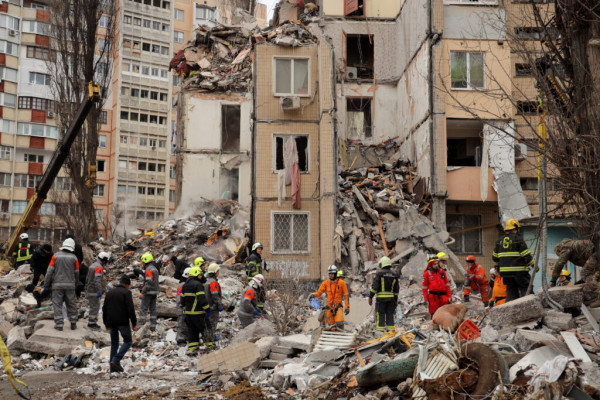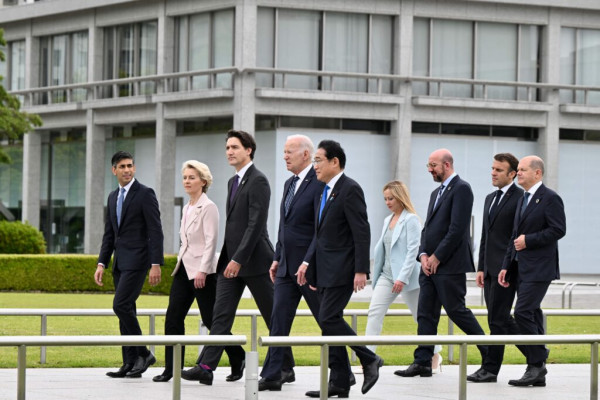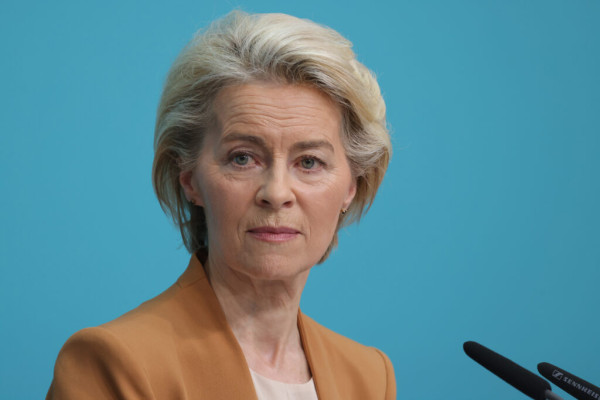Western allies split over how to make Putin pay
BRUSSELS — America and Europe can’t agree over how far they should go in forcing Russia to pay to rebuild Ukraine.
One suggestion, not so long ago dismissed on both sides of the Atlantic as pie in the sky, is now gaining serious momentum — and causing serious tensions between allies, too.
The idea would be to confiscate assets belonging to the Russian state that were frozen when the Kremlin launched its invasion of Ukraine two years ago. Such a raid would potentially free-up more than €250 billion.
It's a plan that U.S. President Joe Biden's administration is backing heavily but so far Europe’s most powerful governments in Paris, Berlin and Rome are unconvinced. Washington policymakers are piling pressure on their allies to ditch their hang-ups over what would be an unprecedented step fraught with legal, ethical and political difficulties.
“It’s never been done before to seize a country’s reserves,” said Charles Lichfield, an analyst with the Atlantic Council and a leading expert on Russian frozen assets. “But crossing the threshold, the irreversible threshold, where you take them away and give them to Ukraine, while morally it may seem right … the Europeans are not yet comfortable with doing it without a more sound legal basis, which has not yet been found.”
Washington's determination has alarmed European governments that worry such a move would spook investors in the euro. Others fear Moscow could retaliate by targeting European assets in Russia and launching cyberattacks against Western countries. Some say that however heinous Moscow’s behavior, a country shouldn’t be forced into reparations while war still rages.
The problem for the U.S. is that the vast majority of the assets are kept in Belgium, in the security depository Euroclear ― America holds only negligible amounts ― so any confiscation move would need European approval. The hope is that the G7 group of leading industrialized nations will come up with a common position later this year.
EU doesn't plan full-scale confiscation
A senior Biden administration official, having been granted anonymity to discuss the sensitive issue, confirmed to POLITICO there are tensions between the U.S. and some of its European allies over the matter.
The European Commission, the EU's executive arm, is not ready to go beyond an existing plan that only targets the revenues generated by the frozen funds, rather than a wholesale confiscation of the assets.
“We are encouraged by any action the EU may take to use immobilized sovereign Russian assets for the benefit of Ukrainians," said a U.S. State Department spokesperson, granted anonymity because of the issue’s sensitivity. "We continue to be in active conversations with our allies and partners, including the G7, on what additional steps may be possible within respective legal systems and under international law."
With Russia’s invasion grinding into a third year and with the Ukrainian army running short of artillery ammunition, Western disagreements over financing aid have come at a difficult time for Kyiv.
The U.S. has had problems finding cash to send to Ukraine, with Biden’s efforts to push a $60 billion support package to Kyiv through Congress thwarted by Republican lawmakers.

The senior U.S. administration official dismissed the idea, put forward by some observers, including the Atlantic Council's Lichfield, that the fight in Congress contributed to Washington’s eagerness for full-scale confiscation of frozen assets, insisting this had been in the works prior to the logjam on Capitol Hill.
“We’ve always envisioned this for Ukraine’s reconstruction, because it’s the only way realistically to meet Ukraine’s reconstruction needs,” the Biden administration official said.
Germany, France and Italy are worried
European capitals have been largely shying away from the debate altogether. For them, it’s way too risky.
The European Commission is to put forward its far more limited plan to use only the profits generated by the assets — worth around €3 billion per year.
An official from a G7 country told POLITICO that using revenues is the only idea on the table as it is seen as a legally safer option. They added that there is no appetite in Brussels to talk about confiscation.
"We are not talking about seizing the frozen assets," the EU's foreign policy chief, Josep Borrell, told reporters on Tuesday. "The discussion is about the revenues produced by these assets."
The three EU countries with a seat around the G7 table — Germany, France and Italy — are worried that confiscating assets will tarnish the reputation of the eurozone and potentially discourage international investments.
They have found an ally in the European Central Bank (ECB), which has repeatedly warned of instability in the euro currency if foreign countries take fright and transfer their assets outside the bloc.
Resistance caused the European Commission, the EU's executive arm, to push back the presentation even of its more limited plan.
The Commission initially signaled that the timing of the proposal would coincide with the two-year anniversary of Russia’s invasion of Ukraine on Feb. 24. But it moved past its unofficial deadline as national capitals pushed for more time to assess the legal and financial consequences.
“The text [of the proposal to use revenues] is ready,” an EU official told POLITICO on condition of anonymity. “We’re only waiting for a political signal from member states.”
But in a sign that the plan may move forward incrementally, the Commission has already put forward a proposal, even less significant still, that would force the revenues of invested assets to be deposited in a separate account of clearinghouses ― financial institutions that facilitate transactions ― where they are held.

The EU executive took this gradual approach to gauge the reaction of financial markets and assuage the fears of national capitals, said two Commission officials.
While the U.S. welcomed the progress, it urged its European allies to move faster and explore ways to target the assets themselves, not just the proceeds.
“My European colleagues have now taken an important first step to harness windfall proceeds from Russian sovereign assets, an action I fully endorse,” U.S. Treasury Secretary Janet Yellen said.
Profits could be used to buy military equipment
The glacial progress is creating some embarrassment for European Commission President Ursula von der Leyen, who has forged close ties with Biden on foreign policy. She is betting on her record as a supporter of Ukraine to win a second term in office later this year.
Her seemingly impromptu proposal to use profits from the assets to buy weapons for Kyiv last week left European governments, and even her own commissioners bewildered, officials said.
“It is time to start a conversation about using the windfall profits of frozen Russian assets to jointly purchase military equipment for Ukraine,” von der Leyen told EU lawmakers last Wednesday.
Previously the Commission signaled that the revenues would be added to a dedicated pot for Ukraine, which could not be used to purchase weapons.
European diplomats fear governments that are already reluctant to support Ukraine will oppose channeling the proceeds of frozen assets for military purposes.
Ukraine wants breakthrough at G7 summit
The scene is set for fraught discussions between Europe and the U.S. at a summit of G7 leaders in the southern Italian region of Puglia in June.
The U.S. will pile pressure on its European allies to move closer to its stance before the gathering, while Ukraine is hoping the summit could deliver a breakthrough.
There might be a middle way that goes further than the EU's existing plan but not as far as full confiscation.
This would consist of using these assets as collateral for a bank loan to finance Ukraine’s reconstruction, according to a proposal floated by the Belgian government, which is being discussed at the G7 level. Western countries would hand over Russian frozen assets to Kyiv only if the Kremlin refuses to repay the loans as war reparations once the conflict is over.

This idea would be legally safer in the short term as it leaves the assets in limbo, but would not stop confiscation further down the line, said Pierre Klein, an international law expert at the Free University of Brussels.
“I don't feel that there would be a major legal problem in seizing the assets ... legal issues are justifications or excuses,” said Klein. “It's mostly a political decision.”
Sorgi reported from Brussels. Toosi reported from Washington. Alex Ward in Washington and Julia Wacket in Berlin contributed to this article.